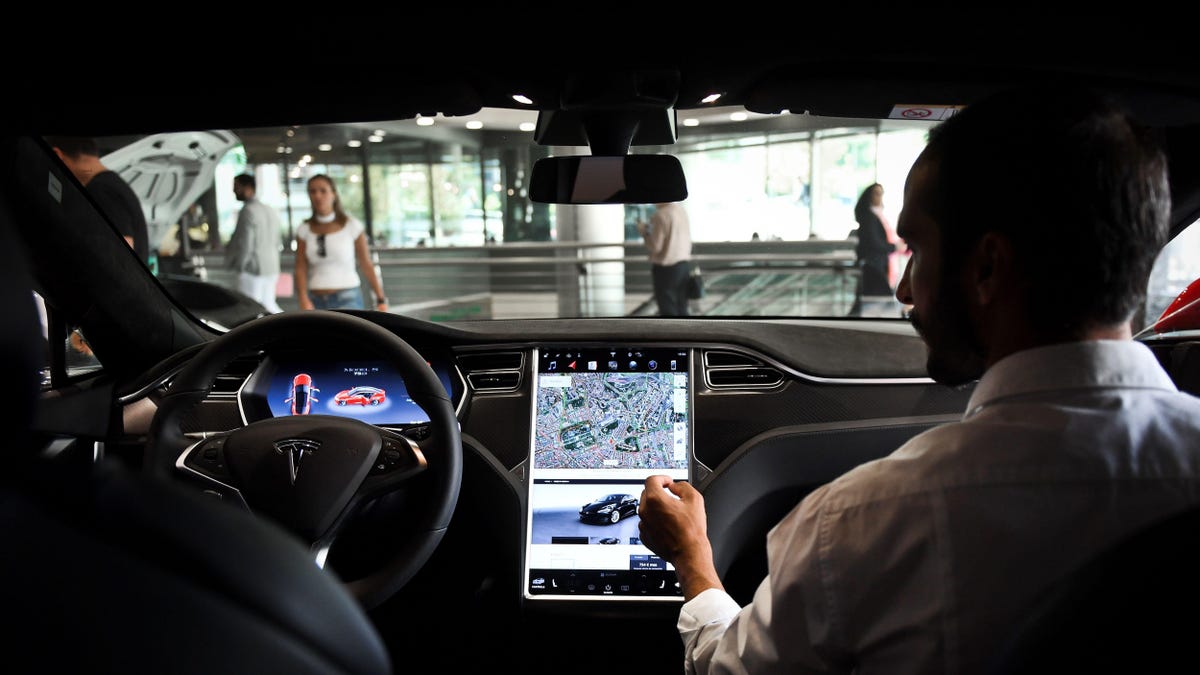
Tesla has gained its fair share of interest from regulators and safety advocates in recent months over the fraught deployment of its “Full Self Driving” beta system, but it has so far managed to largely avoid scrutiny over its decision to quietly add in the ability to play video games while driving.
Videos of reviewers and drivers accessing the game while in motion have popped up on YouTube and were noticed by the New York Times this week. While gaming in Teslas isn’t new, (the company started adding arcade-style games back in 2019) doing so while the vehicles are out of park is.
According to the Times, that particular feature was shipped over the summer as part of an over-the-air update. The update included three new games—Solitaire, Sky Force Reloaded, and The Battle of Polytopia: Moonrise—all of which are allegedly playable while driving. When these games are launched, the user is shown a warning saying the game should only be played by the passenger. There is nothing currently stopping the driver from simply lying and starting up the game regardless, according to the report.
Tesla didn’t immediately respond to Gizmodo’s request for comment.
Tesla’s decision to double down on video games and other in-car entertainment like Netflix and Hulu streaming comes despite long-standing NHTSA guidelines recommending device makers design systems so they can’t be used by drivers to perform “inherently distracting secondary tasks while driving.” Though other carmakers offer systems that let drivers and passengers watch movies or other entertainment in the front display, those are usually disabled when drivers shift out of park. The stakes here are high: Distracted driving accounted for 8.7% of U.S. car crash fatalities, according to NHTSA data, though many experts expect the figure could be much higher.
The NHTSA did not immediately respond to Gizmodo’s request for comment.
Presumably, Tesla’s rationale for adding video games into its vehicles stems from its vision of creating a fully autonomous vehicle experience where drivers can take back the time they would have wasted screaming in traffic to do work or entertain themselves. This vision, of turning vehicles into the next screen, is shared by many in the auto industry and is why traditional consumer technology companies like Apple and Xiaomi are reportedly working on their own driverless vehicles. CEO Elon Musk expanded on this idea himself earlier this year while showing off a demo of someone playing Cyberpunk 2077 in a Tesla.
“Think about the future where the car is often in Autopilot or Full Self Driving Mode, then entertainment is going to become increasingly important,” Musk said. “You’re gonna wanna watch movies, play games, use the internet, all the things you want to do if you’re not driving.”
The only problem is, Tesla’s aren’t fully autonomous—and they aren’t even very close.
Though Tesla is currently beta testing its “Full Self Driving” driver assistance feature, the name is deceiving since it only actually achieves Level 2 autonomy on a six-level scale. Tesla was forced to come clean about FSD’s regulations in a letter to regulators late last year. But that message has not been clearly articulated to Autopilot users or FSD beta participants, and the video game additions only add to that confusion. All this has the effect of potentially encouraging drivers to treat the system as more advanced than it is. And with some Teslas costing around $100,000, can you really blame drivers for expecting an experience more exciting than a glorified cruise control?
Those were part of the concerns Sens. Richard Blumenthal and Ed Markey outlined earlier this year when they sent a letter to Federal Trade Commission Chair Lina Khan urging her agency to investigate Tesla for misleading advertising around Autopilot and FSD.
“We fear that Tesla’s Autopilot and FSD features are not as mature and reliable as the company pitches to the public,” the senators wrote. “Understanding these limitations is essential, for when drivers’ expectations exceed their vehicle’s capabilities, serious and fatal accidents can and do result.”
These systems are already leading to real-world accidents, which are at the risk of increasing the more entertainment features are added. For those keeping track, the NHTSA is currently investigating 11 crashes that have occurred since 2018, all of which involve Teslas colliding with first responder vehicles. These crashes caused a total of 17 injuries and one death, according to the agency. On top of that, a complaint filed to the NHTSA last month appears to show the first instance of a major crash involving Tesla’s FSD beta.
